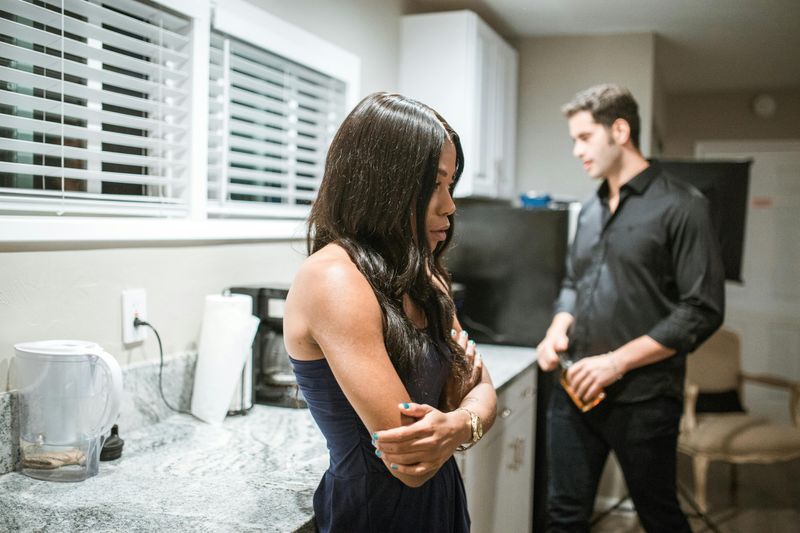9 Alarming Signs You’re Trapped in a Narcissistic Relationship

Relationships should feel like safe harbors, not emotional battlegrounds. Yet many people find themselves entangled with partners who consistently put their own needs first while dismissing others’ feelings. Narcissistic relationships can slowly drain your confidence and happiness, often without you realizing what’s happening until you’re deeply ensnared. Recognizing these warning signs early can help you protect your mental health and make informed decisions about your relationship future.
1. Everything Revolves Around Their Needs

Your partner craves constant praise and attention, making everyday conversations somehow loop back to their achievements or problems. When you share good news, they either dismiss it or find ways to outshine you with their own stories.
Social gatherings become performances where they must be the star. Even during your hardest times, they seem incapable of setting aside their need for admiration to support you.
This endless hunger for validation leaves you feeling invisible and emotionally drained, as if your role is merely to be their audience rather than an equal partner deserving of attention and care.
2. Your Feelings Are Brushed Aside

“You’re too sensitive” becomes their standard response whenever you express hurt feelings. Your emotional pain is consistently minimized or ignored, while their discomfort receives immediate attention and remedy.
Attempts to discuss how their actions affect you are met with blank stares or irritation. The emotional connection most relationships thrive on seems mysteriously one-sided.
This absence of empathy creates a profound loneliness even when you’re together. The partner who should understand you best seems incapable of stepping outside their own experience to acknowledge your emotional reality, leaving you questioning if your feelings are actually valid.
3. Reality Feels Increasingly Distorted

“That never happened” or “You’re remembering it wrong” become phrases you hear regularly. Your partner confidently rewrites history, denying conversations or promises they clearly made, leaving you questioning your own memory.
They might subtly rearrange your belongings, then insist you misplaced them. When confronted with evidence of their hurtful behavior, they create elaborate alternative explanations that somehow make you the problem.
This systematic reality distortion—gaslighting—gradually erodes your confidence in perceiving the world accurately. The constant second-guessing exhausts you mentally while strengthening their control, as you increasingly rely on them to define what’s real.
4. Mistakes Are Always Your Fault

When arguments erupt, a strange pattern emerges—somehow, regardless of what happened, you end up apologizing. Your partner displays remarkable agility in shifting responsibility, transforming their clear mistakes into your failures.
Their lateness becomes your fault for not reminding them. Their angry outburst gets blamed on your tone of voice. Even bringing up legitimate relationship concerns gets twisted into you being “too needy” or “causing drama.”
This relentless blame-shifting creates a relationship where you carry the emotional burden for everything that goes wrong. Over time, you begin preemptively apologizing and walking on eggshells to avoid becoming their scapegoat again.
5. Your World Keeps Getting Smaller

Friends and family who once filled your life start disappearing—not by accident, but by design. Your partner finds subtle and not-so-subtle ways to criticize your loved ones, creating tension that makes maintaining those relationships increasingly difficult.
They question why you need “so much time” with others or create emergencies requiring your attention whenever you have plans. Career opportunities or hobbies that might build your independence face similar sabotage.
This systematic isolation happens gradually enough that you might not notice until you’re primarily dependent on them for emotional support and validation. The resulting loneliness makes leaving seem impossible, exactly as they intended.
6. Whiplash Between Worship and Worthlessness

Remember the beginning? They couldn’t get enough of you—constant texts, lavish compliments, and declarations that you were unlike anyone they’d ever met. That magical period felt intoxicating until the switch flipped.
Now their comments carry subtle digs about your appearance or intelligence. Affection has become conditional, withdrawn without warning, then briefly restored to keep you hoping. The person who once treasured everything about you now seems disappointed by those same qualities.
This cycle of idealization followed by devaluation creates an addictive emotional rollercoaster. You chase the high of their approval while accepting increasingly poor treatment, hoping to recapture that initial golden period.
7. Rules Apply to Everyone But Them

Your relationship operates under a bizarre double standard where expectations only seem to flow one way. They demand absolute loyalty while keeping their own relationships suspiciously vague. Their time is precious, but yours should always be available.
When you’re five minutes late, it’s disrespectful; when they’re an hour late, you’re overreacting. They expect constant forgiveness for behaviors they’d never tolerate from you.
This profound sense of entitlement reveals itself in small moments—interrupting your stories while expecting rapt attention for theirs, or criticizing your spending while justifying their own extravagances. The underlying message becomes clear: different rules apply because they genuinely believe they’re special.
8. They Monitor Your Every Move

What initially felt like flattering interest has morphed into suffocating surveillance. They need to know where you are, who you’re with, and what you’re doing at all times—not out of care, but control.
Innocent conversations with others trigger accusations or sulking. They check your phone when you’re not looking or demand your passwords as “proof of trust.” Male or female friends are viewed as threats rather than normal social connections.
This possessiveness masquerades as love but actually reveals deep insecurity and a view of you as property rather than partner. The constant defending yourself against unfounded suspicions drains your energy while their jealousy progressively restricts your freedom.
9. Walking an Emotional Tightrope

One moment everything seems peaceful; the next, you’re facing explosive anger over something minor. These mood shifts happen with unsettling unpredictability, keeping you constantly alert for warning signs of the next storm.
Good periods feel precarious rather than secure. You find yourself mentally rehearsing conversations, carefully selecting words least likely to trigger their rage or disappointment. The relationship exhausts you not from healthy growth but from emotional vigilance.
This unpredictability serves a purpose—keeping you perpetually off-balance prevents you from establishing boundaries or addressing real issues. The emotional highs create just enough hope to endure the increasingly frequent lows that leave you questioning your worth.

Comments
Loading…